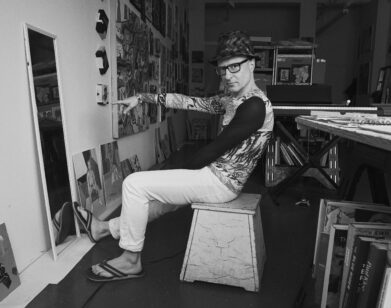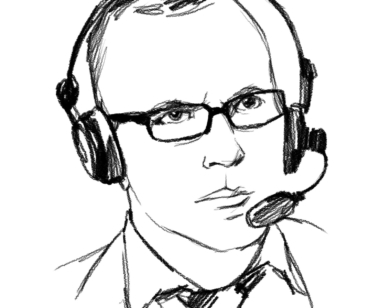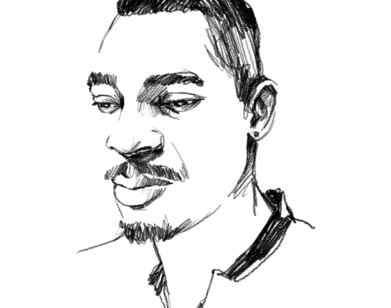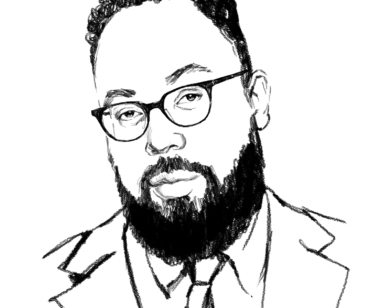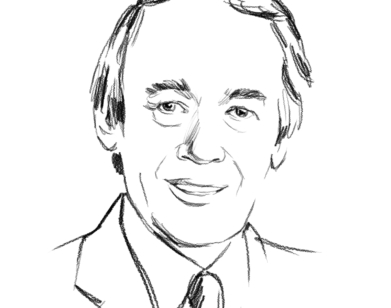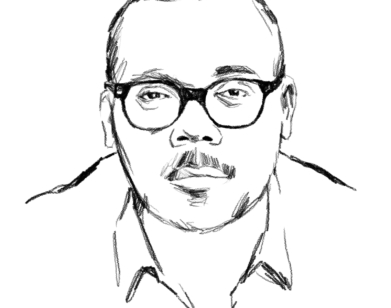Ask a Sane Person: Wayne Koestenbaum Is Drowning in a Sea of Zoom
The writer, critic, artist, musician, and all-around highly functioning creative soothsayer Wayne Koestenbaum should always be listened to about matters of culture and style. That’s doubly true this year, as he has just published his most recent collection of wise and rambunctious essays, Figure It Out, from Soft Skull Press.
———
INTERVIEW: Where are you and how long have you been isolating?
WAYNE KOESTENBAUM: I’ve been in Germantown, New York, for nearly two months. The isolation is relative, and punctuated by periods of brief congregation. Today I went food-shopping and saw a gender-nonconforming person who made me feel glad to be alive. Today, on a semi-rural road, I saw a tall man in gym shorts walk alongside a not tall woman in spiky boots, and I wondered if they were married or living together or just seeking each other’s company momentarily for the purposes of emotional recuperation. Seeing them together gave me a quick jolt of happiness.
INTERVIEW: What has this pandemic confirmed or reinforced about your view of society?
KOESTENBAUM: I feel more eschatological than ever before. I’d once imagined that there would be generations and generations of people after me, before the final End. And now every sky seems overshadowed by a terminal weight. I once had an ant farm. I don’t know how long my ant farm lasted, as a plaything. I’ve been thinking about ant farms again.
INTERVIEW: What has this pandemic altered about your view of society?
KOESTENBAUM: My capacity to imagine has dwindled. Trauma—even of the trickle-down variety—stymies ratiocination. Perhaps, in the past, I thought too much, conjured too much? Now I can’t picture what society is or should be or will be. But then I think of Mike Leigh’s Vera Drake, or of Simone Weil, and decide I should never again raise my voice; I should give precedence to workers whose actions speak.
INTERVIEW: What is the worst-case scenario for the future?
KOESTENBAUM: The planet will be uninhabitable. The humans who remain will be few, and miserable. The libraries will have been long ago destroyed. Plagues and drought, fire and deluge. No one will remember what came before; no one will have the stamina to tell tales based on rumors of how human beings once upon a time knew how to stimulate and nourish each other.
INTERVIEW: What good can come out of this lockdown? Are there any reasons to hope?
KOESTENBAUM: If restaurants re-open, I hope that they will be quieter. People who’d ordinarily have rebuffed or ignored each other might declare a truce—an armistice filled with embraces and lubricious confidences. A general strike? A nonviolent coup d’état? Flower power? Maybe people will stop trying to prevent art from thriving. People will let art arise wherever it has the will to emerge.
INTERVIEW: Do you predict an outcome of a more inclusive globalism or more nationalism and isolationism?
KOESTENBAUM: Some countries will be more global. Some will be more isolated. Some will be governed by lunatics. Some will be governed by kind, qualified stewards of the people’s weal. I want there to be small houses everywhere, modest and non-invasive houses: small rooms for people willing to be small, to remain non-dominant, to refuse power. Refusal might not be a coherent strategy.
INTERVIEW: More socialism or more authoritarianism?
KOESTENBAUM: If I say “more socialism,” will there be a better chance of more socialism happening?
INTERVIEW: How will world governments be remembered for their responses to the pandemic?
KOESTENBAUM: I heard about some exciting stuff going on in Copenhagen. I hope I live long enough to see infamy rain down upon politicians complicit with the current regime of unkindness. Is that too inflammatory?
INTERVIEW: What has been your daily routine during this time?
KOESTENBAUM: I go to bed a half-hour later than usual. I don’t eat sandwiches. I drink an extra cup of coffee per day. I look forward with more avidity to evening’s wine.
INTERVIEW: Describe the current state of your hair?
KOESTENBAUM: Incorrigible. My best friend is a spray bottle, filled with tap water. I spray my head a dozen times a day. The mist temporarily tames the mess. Nine-tenths of my remaining hair provokes shame, when I look in the mirror: “Is that unhomely specter me?”
INTERVIEW: On a scale of 1 to 10, what is your level of panic about the current state of the world?
KOESTENBAUM: Nine. High level of panic, but no adrenaline attached to it. A steady Cassandra-type calm: no shrieks, merely prognostication, and bitter, monosyllabic attestations.
INTERVIEW: What is your ultimate novel, film, and album for self-isolation?
KOESTENBAUM: Two novels: Magda Szabó’s The Door and Friederike Mayröcker’s brütt, or The Sighing Gardens. Visions of tenacious isolation, the misery and sublimity thereof. Two films: Jonas Mekas’s Walden and Agnès Varda’s The Gleaners and I. Visions of making-do; scrap-collecting; fastidious accretion of remembered particles. Two albums, or boxed sets: Anna Moffo singing Puccini’s La Rondine; Kathryn Stott playing the complete piano music of Fauré. Just enough dissonance to make the tonality go down.
INTERVIEW: Who would be your nightmare person to spend a month of lockdown with?
KOESTENBAUM: Klaus Kinski as Nosferatu.
INTERVIEW: What thinker have you taken comfort in of late and why?
KOESTENBAUM: Jean-Luc Godard’s films, from Une femme est une femme through Le gai savoir, have made me glad that sound and image can be experimentally sundered from each other for pleasure-giving yet didactic ends.
INTERVIEW: If 2020 were a song, which song would it be?
KOESTENBAUM: “Mack the Knife.” For its mood of up-tempo gloom. “I Want To Be Happy,” or “It Never Entered My Mind,” or “A Foggy Day.” For their attempts to ameliorate. One of Richard Strauss’s “Four Last Songs,” but without orchestra or piano—just the voice, in isolation, deprived of the sonorous envelope containing the edged plaint.
INTERVIEW: Where did we go wrong? Like, what was the exact moment?
KOESTENBAUM: When the first genocide occurred. When Adam and Eve grew ashamed of their nakedness. When Europeans destroyed indigenous civilizations. Was there a first moment, a decisive instant—and, if so, was that moment a seemingly insignificant transposition of a single letter, a switch from an “e” to an “o,” a “no” to a “yes”? José Saramago, in The History of the Siege of Lisbon, imagines that one inserted word in a historical text has the power to reverse what actually happened. There might have been a moment, in pre-history, when one uttered word, one morpheme, catalyzed a process (a chain reaction) that led to our current predicament.
INTERVIEW: Which (admittedly totally unqualified) celebrity would you trust with the planet’s future?
KOESTENBAUM: Isabelle Huppert.
INTERVIEW: If you could stop time at one particular moment in your life, which moment would it be?
KOESTENBAUM: The moment I saw Isabelle Huppert perform, live, in Florian Zeller’s play The Mother, at New York’s Atlantic Theater Company, in 2019.
INTERVIEW: What’s one skill we should all learn while in quarantine?
KOESTENBAUM: How to stop eating meat. (That’s a skill I haven’t mastered. Tonight’s brutal repast was hamburger.)
INTERVIEW: State vs. federal? Who should have the power to control the movements and reopening of economies for its people?
KOESTENBAUM: Someone with the temperament of Barack Obama.
INTERVIEW: Is this circumstance a win for technology and the virtual world or for the value of real human contact?
KOESTENBAUM: My days and nights are drowned in Zoom, as if in the malmsey butt of Shakespeare’s Richard III. Under the guise of re-connection and gregariousness, we’ve surrendered our agency; we’ve become the consequence of our machines, the sub to technology’s dom. And we’re not even a beloved bottom. Technology doesn’t get turned on by topping us; we’re motor oil, a means of combustion, glug glug glug goes the pump as we’re fed by spigot into Google-esque tanks.
INTERVIEW: What prevents you from giving up hope in the human race?
KOESTENBAUM: Today, on my ritual 10-minute stroll, I noticed more trees than I’d ever before admitted into consciousness. Complicated trees. Trees entangled with each other. Trees intersecting with vines and other forms of spreading creatureliness. Trees silently accompanying each other. Trees with numinous sentience. Trees with plural (though wordless) animating capacities. Trees that refused singleness, even as they pretended to stand separate in their unmingled grove.
INTERVIEW: Who should be the next president of the United States?
KOESTENBAUM: Most good answers to that question are impossibilities. A thousand people are qualified to be president. I want any one of them. I don’t want a fascist. I want someone who reads. I want someone who sides with the suffering.


